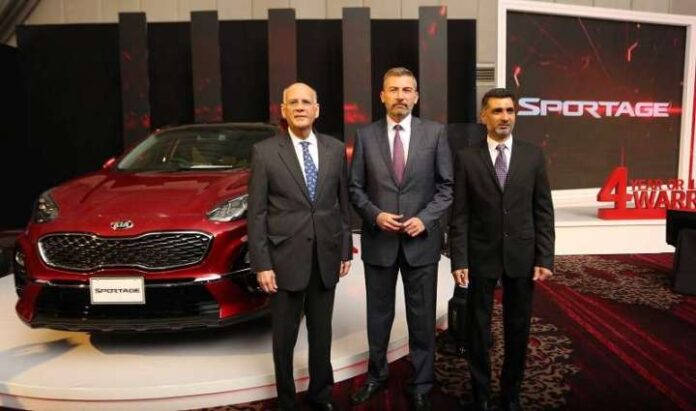KARACHI: KIA Lucky Motors (KLM) CEO Asif Rizvi admits Pakistan is facing ‘very difficult times’ but at the same time he cited several indicators that show Pakistan’s auto industry is all set to bloom and the ‘consumers will come out to be winners’, he shared these views while talking to Profit on the sidelines of the launch event for KIA Sportage.
The reason for Rizvi’s and KIA’s faith in Pakistan’s auto industry potential was the low number – 1.65 cars sold per thousand persons annually. The global average stands at 12.8 cars. If the global average of Pakistan is adjusted to the global average, Pakistan’s auto industry would stand at 2.5 million cars. Whereas in 2018, only 320,000 cars were sold.
However, after per capita correction, the annual sales should stand at 450,000 annual car sales, which has not been the case so far. So, adjusting global parameters according to Pakistan’s per capita income, there is unfulfilled demand for 130,000 cars that could be achieved. So he sees great potential for the industry to expand. According to Rizvi, Pakistan’s auto industry would expand to 0.5 million cars by 2025 and to 1 million cars in the next 10 to 12 years.
It had been rumoured that new entrants in Pakistan were regretting their decisions and were planning to close shop after Pakistan Tehreek-e-Insaf took charge of running the government. Meanwhile, many auto experts believe that the current government’s policies were not favourable and would hurt Pakistan’s auto industry seriously, as seen by the drop in manufacturing, sales and profits.
Rizvi said that entrance of the newcomers in the aftermath of Auto Development Policy (ADP) 2016-21 would shake the current players from slumber and more importantly would give better choices to Pakistani consumers, who were deprived of choice due to lack of competition. The new entrants, as well as current players, will compete to give better choices to consumers.
Rizvi said before Pakistani consumers of a certain price range or engine size would have to choose strictly from one or maximum of two brands.
“But now that would change and consumers will come out as winners,” Rizvi said this during his presentation here at a local hotel on the occasion of the official launch of Sportage. KLM has invested $175 million on setting up a new auto plant with a capacity of 50,000 units per year.
However, Rizvi said that to unleash that potential, the government has to play its part. The government should increase its revenue from the industry by imposing smaller levies to enable higher volumes, which would actually increase overall tax collection.
“If a 5 per cent new tax stops a potential buyer from buying a new car, resultantly the government would lose a 35 per cent tax collection.” Rizvi explained to Profit, that if a buyer pays 30 per cent to 38 per cent in taxes when he or she buys a new car, depending on the car, then the government loses the whole chunk and ultimately the revenue that is to come from the running and maintenance of that car.”
The increasing exchange rates, interest rates and new taxes have forcibly dropped auto industry sales to 270,000 cars this year as compared to 320,000 sales of last year. Rizvi said that the increase in levies must have been inversely proportional to revenue collection from the industry by the government.
Rizvi said that earlier, Pakistani consumers had limited choices of brands and models. There were long waiting periods and some consumers even had to pay a premium to get their vehicles delivered early, but after the new entrants come in the market, consumers will not have to pay any premium nor will they have to wait months for delivery of vehicles.
Talking about the tax concession for new entrants, Rizvi said that the concessions have been given to attract new investment in the auto sector and thus increase the choices and options of locally produced vehicles for the Pakistani buyers. The existing players have a huge localization advantage over the newcomers in this sector. He said it would take any new entrant at least 5 years to achieve similar levels of localization, hence tax concessions should be given by the government to ensure level playing field for all auto players.
Rizvi said that KLM has entered into the Pakistani market with a long-term commitment. He thanked the Board of Investment, Ministry of Production and Industries and The Engineering Development Board for taking this bold step for the advancement of the automobile manufacturing industry in Pakistan for the benefit of the consumer.
Talking about the global ranking and quality of KIA vehicles, Rizvi informed that for five consecutive years, KIA has been ranked as the top-rated mass-produced car in the JD Power’s Initial Quality Survey which is based on their own internal inspection processes. JD Power is an American company that ranks vehicles.
Meanwhile, KLM on Wednesday launched all-wheel 2000 CC SUV KIA Sportage. Rizvi claims it is Pakistan’s first All-Wheel Drive car with a 100,000 km or 4 years warranty. Sportage comes in two models – top of the line being an All-Wheel Drive (AWD) version, which is a first of its kind in Pakistan among locally manufactured vehicles.
Rizvi said that KLM has been canny to enter Pakistan auto fray with mid-size SUV Sportage as it spotted a gap in prize range and engine size, which have not been catered.
There’s only one car, Fortuner (2700CC) above the 1700CC range which is priced at Rs8 million. All other cars, which are 1700CC or less, are priced below Rs4 million.
Meanwhile, Rizvi informed that currently KLM has 15 dealers across Pakistan and KIA has a 3-year programme to expand its dealers’ network in all major cities of the country.

























thanks for sharing